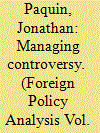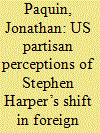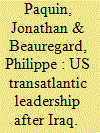|
|
|
Sort Order |
|
|
|
Items / Page
|
|
|
|
|
|
|
| Srl | Item |
| 1 |
ID:
121235


|
|
|
|
|
| Publication |
2012.
|
| Summary/Abstract |
Is Canada's foreign policy aligned with that of the United States? This
question frequently comes up in foreign policy circles and was recently
raised during the popular uprisings in North Africa and the Middle East.
Some observers have maintained that Ottawa's policy with regard to the
"Arab Spring" followed that of Washington.1
This criticism is in keeping with
the perception that, since coming to power in February 2006, the Harper
government has strategically aligned Canada's policies more closely with
those of the United States.2
Some positions of the Harper government, in particular with respect to the Kyoto Protocol, the Israeli-Palestinian conflict,
and the North American security perimeter, have reinforced this idea.3
|
|
|
|
|
|
|
|
|
|
|
|
|
|
|
|
| 2 |
ID:
084295


|
|
|
|
|
| Publication |
2008.
|
| Summary/Abstract |
This article attempts to explain why the U.S. recognition of Macedonia's independence was such a long and controversial issue that lasted from 1991 to 2004. Based on a defensive positionalist model, this essay suggests that the search of regional stability in the South Balkans was the consistent interest pursued by the U.S. toward Macedonia, and that this preference justifies the slowness with which the U.S. granted recognition. The article also runs counter to the ethnic lobby argument, which is increasingly regarded as a major determinant of American foreign policy toward self-determination movements. More specifically, the analysis casts serious doubt on the proposition that the Greek-American community, through its mobilization, compelled the U.S. government to delay Macedonia's recognition, despite what some liberals have argued.
|
|
|
|
|
|
|
|
|
|
|
|
|
|
|
|
| 3 |
ID:
160803


|
|
|
|
|
| Summary/Abstract |
While Stephen Harper’s foreign policy sparked heated debates during his entire tenure as prime minister, these debates were mainly confined to Canadian foreign policy circles. Little attention was paid to allies’ perceptions of these developments and, more specifically, to the perception of the United States, Canada’s main economic and security partner. How did the Bush and Obama administrations perceive these changes? Were they seen as a break from Canada’s past? Did Harper’s handling of foreign policy alter White House calculations with respect to Canada? Based on a series of semi-structured interviews conducted in Washington DC with executive officials a few months prior to the end of the Harper era in 2015, this essay shows that despite a widespread perception in Washington that Canada’s foreign policy approach had changed under Harper, partisanship was the main dividing line in terms of how this approach was perceived and assessed.
|
|
|
|
|
|
|
|
|
|
|
|
|
|
|
|
| 4 |
ID:
142067


|
|
|
|
|
| Summary/Abstract |
This article explores whether the United States has been able to exert transatlantic leadership since its head-on diplomatic collision with several European capitals over the 2003 Iraq war. Considering that the decision to invade Iraq was made by the Bush administration, this article also explores whether there has been consistency between the Bush and Obama administrations over transatlantic leadership. To answer these questions, this article reports on a computer-assisted content analysis of the 415 official statements issued by the core transatlantic allies, namely the United States, France, and Britain, in response to four major crises that have occurred in the Middle East and North Africa in the post-Iraq era. This analysis provides qualitative and quantitative evidence leading to four main conclusions. Firstly, US leadership has endured in the post-Iraq era. Secondly, in most cases, France and Britain have aligned their diplomatic positions with those of the United States. Thirdly, the analysis confirms that there is a special Anglo-American relationship. Fourthly and lastly, there has been consistency between the Bush and Obama administrations, with the exception of the US response to the Libyan crisis, which suggests the emergence of a US ‘leading from behind’ transatlantic strategy.
|
|
|
|
|
|
|
|
|
|
|
|
|
|
|
|
|
|
|
|
|